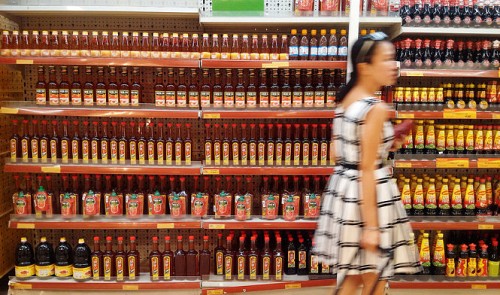The Vietnamese Ministry of Health is poised to put two major fish sauce makers, Masan Food and Khai Hoan JSC, through a complete inspection next month, not long after a ‘toxic fish sauce’ scandal unnerved local consumers.
The inspection is scheduled for after the Lunar New Year holiday, which begins on January 28 and lasts for one week, it said on Wednesday.
Masan Food, a subsidiary of private consumer giant Masan Group, is considered a dominant force in Vietnam’s fish sauce market with its Chin-su and Nam Ngu brands.
Khai Hoan JSC, headquartered on the southern island of Phu Quoc, is known for its Ong Ky Fish Sauce trademark.
Masan Food is also behind Tam Thai Tu, a soya sauce brand, and instant noodle brands Omachi and Tien Vua.
An official from the health ministry's inspectorate told Tuoi Tre (Youth) newspaper that the inspection order also applies to subsidiaries of the two companies, bringing the real number of fish sauce makers expected to be inspected to more than ten.
The health inspectorate did not elaborate on why they chose to start the New Year by examining the fish sauce companies, though a recent high-profile scandal involving the safety of traditional Vietnamese fish sauce is still fresh in the minds of the public.
In October 2016, the Vietnam Standards and Consumers Association (Vinastas) announced that it had tested fish sauce samples from 88 local businesses and found that nearly 85 percent were above the national limits for “total arsenic content.”
While arsenic exists in organic and inorganic form, only the latter is toxic - a detail intentionally withheld from the Vinastas report which left consumers unaware of the difference between “total arsenic” and “inorganic arsenic,” panicking them and the whole industry.
The survey results were later identified as misleading and the cause of false fears among the public. Vinastas made a public apology and rectified the false information.
The false claims in the report also tricked fifty news outlets into running stories about unsafe fish sauce, scaring local consumers who use traditionally made fish sauce rich in organic arsenic on a daily basis.
A controversial ad published by Thanh Nien (Young People) newspaper, an outlet which also ran misleading stories and surveys which fueled public fear, stated that the mass-produced Chin-su and Nam Ngu sauces were safe in terms of arsenic content.
It was later confirmed that T&A Ogilvy JVC Ltd. commissioned Vinastas to carry out the survey.
In the aftermath of the scandal, Thanh Nien was fined VND200 million (US$8,929), while the other 49 media outlets were fined between VND10 million ($446) and VND50 million ($2,232).
After the fish sauce companies, the health inspectors will continue to look into major dietary supplement producers.
Last year they inspected four leading beverage makers, Coca-Cola Vietnam, Suntory PepsiCo Vietnam Beverage, Wonderfarm and URC Vietnam Co. Ltd., and imposed fines totalling more than VND6 billion ($267,857) for several production violations.






















































